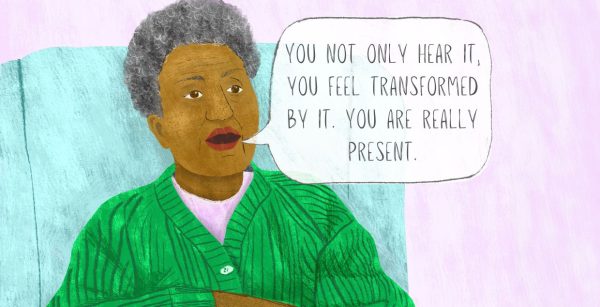Illustration by Krina Patel
At Wishing Well, we see firsthand the transformative effects that live music has for people living with dementia. Every day, in every session we deliver, we witness people feeling more joyful, connecting to their memories, their families and to a sense of their own identity.
Why does music work?
Studies consistently show the profound effects that music has on the mental and physical health of people living with dementia. Dementia UK outlines numerous health benefits; reducing heart rate and blood pressure, relieving muscle tension and helping people manage pain. Not to mention brain benefits too – music triggers feel-good hormones, endorphins, which can ease depression, anxiety and agitation.
How do our participants feel?
Spending time in hospital can be an isolating experience. People may feel lonely and miss their usual routine, familiar people and places. We take our music right to people’s bedsides creating a sense of community, connection and unhurried conversation. A healthcare worker on one of the wards commented:
There is a patient singing and dancing. This patient has been feeling very down; I feel that the patient has lost his sparkle. As soon as [the Wishing Well musicians] started playing, the patient started dancing, smiling and interacting… I think today’s moment will stay with me for a long time.
We open up space where patients can express themselves, share their memories and tell us how they feel. One day we’ll commission a book of all the beautiful stories we have heard!
I can remember all the words! My Mum played the piano. We all sat around singing together. My whole family sang. I haven’t thought about it for a while. But I remember now.
Music brings us into the present moment, distracting us from our worries and helping regulate our nervous systems. People often tell us how much better they feel after singing with us.
I had a bad night, no sleep and was not very happy. But it was such an amazing treat, so unexpected to have musicians come to my room. To ask me what music I liked was a complete joy and helped me turn a corner and get better.
Tips from our musicians
Here are some tips from our Wishing Well musicians to make a music-making session with someone living with dementia a meaningful and accessible experience:
How do I select a song?
The important thing here is that making-music together is a shared activity; the doing is as important as the end result because of the memories and sense of connection it can achieve.
- Go gently and avoid pressure. Instead of asking direct questions like “What’s your favorite song?”, approach the topic more generally.
- Use genres or significant memories. Explore genres like country, folk, or classical music to help narrow down choices.
- You can Ask about past experiences. Conversations about concerts they’ve attended or places they’ve gone dancing can spark inspiration. You can also discuss big events or memories where music may have played a part.
- Incorporating visual cues can be helpful, for example, pictures of singers, scenes from musicals, or images of people dancing can jog memories and guide song selection.
- For further help, consider using the BBC’s Music Memories tool
What if I don’t know the lyrics?
No worries! Here’s how to overcome that:
- Sing along using YouTube or search Google with just one line of the song to find the full lyrics.
- Don’t feel pressured to perform the entire song. If you want to sing unaccompanied together, often singing the first verse and chorus is enough.
Do you need to play an instrument?
Not at all! Singing unaccompanied or “a capella” can be a very calming and connecting experience. If you’d prefer accompaniment:
- Sing along to records, CDs, or YouTube videos.
- Add percussion for an extra dimension. Everyday household items work great as makeshift instruments! Try shaking lentils or rice in a jar, tapping on tables, or using graters and spoons as drums.
Join us in making a difference
Despite the positive results of research into this area, getting music-making into hospitals continues to have its barriers! At Wishing Well, we’re committed to bringing the joy of music to those who need it most. This Dementia Action Week, celebrate with us by supporting our programs, donating, or simply sharing the message of music’s impact.
If you’re worried about yourself or someone close to you can check your symptoms by using the checklist at Alzheimers UK.
